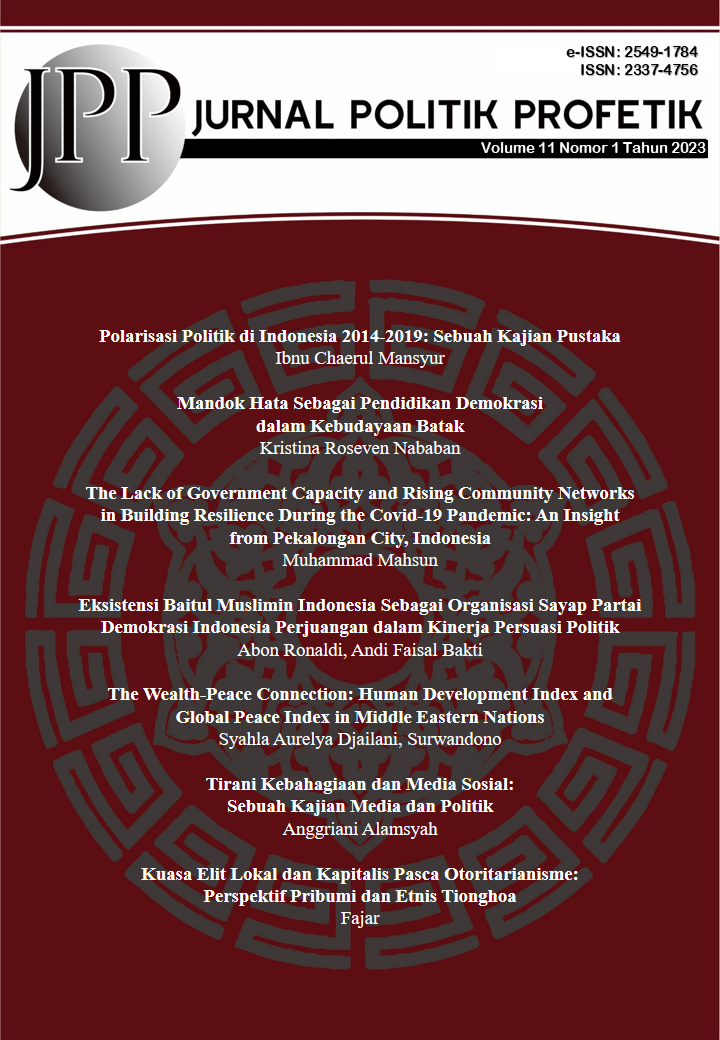The Lack of Government Capacity and Rising Community Networks in Building Resilience During the Covid-19 Pandemic: An Insight from Pekalongan City, Indonesia
Abstract
The Covid-19 pandemic has had a wide impact on various sectors of people’s lives, including socio-economic disruption. In Indonesia, at both local and national government levels, the social protection programs have become a key tool for policymakers to overcome the negative impacts of the Covid-19 pandemic crisis. This study aims to examine how the local authorities and community networks called P2SE (Pekalongan Peduli Sosial Ekonomi or Pekalongan Cares Socio-Economy) in Pekalongan city respond to the socio-economic crisis during the Covid-19 pandemic in order to increase the resilience of urban poor and vulnerable group as well as reducing social inequalities. One way of doing this is through integrated social protection provision involving various communities from local authority, academicians, civil society, businessman and micro small and medium enterprises. This article argues that the community networks-based integrated social protection provision model is an alternative strategy to help state authority in addressing poverty and socio-economic inequality in inclusive and participatory ways. In this way, some issues of inequality and political interests in the process of resource distribution related to the provision of social protection can be minimized. Therefore, this model of providing social protection based on integrated community networks can be used as an alternative strategy to reduce inequality and build the resilience of urban poor and other vulnerable groups when facing crisis due to unpredictable disasters such as the Covid-19.
Downloads
References
Admin RBK. (2020). Dindakom dan UKM Catat Jumlah UMKMdi Kota Pekalongan Capai 22 Ribu. Accessed from https://rkb.pekalongankota.go.id/berita12491-1-dindagkop-dan-ukm-catat-jumlah-umkm-di-kota-pekalongan-capai-22-ribu.html 5 August 2022.
Andriani, H. (2020). Effectiveness of Large-Scale Social Restrictions (PSBB) toward the New Normal Era during COVID-19 Outbreak: a Mini Policy Review. Journal of Indonesian Health Policy and Administration, 5(2), 61-65.
Bashir, M. F., MA, B., & Shahzad, L. (2020). A Brief Review of Socioeconomic and Environmental Impact of Covid-19. Air Quality, Atmosphere & Health, 13, 1403–1409.
Buheji, M., Cunha, K. D. C., & Mavrić, B. (2020). The Extent of COVID-19 Pandemic Socioeconomic Impact of Global Poverty: A Global Integrative Multidisciplinary Review. American Journal of Economics, 10 (4), 213-224.
R.E. Caraka, R.E., Lee, Y., Kurniawan, R., Herliansyah, R., Kaban, P.A., Nasution B.I., Gio, P.U., Chen, RC., Toharudin, T., & Pardamean, B. (2020). Impact of COVID-19 large-scale restriction on environment and economy in Indonesia. Global Journal of Environmental Science and Management, 6(1), 65-84.
Dinas Kesehatan Kota Pekalongan. 2020. Data Pantauan Covid-19 Kota Pekalongan. Accessed from http://corona.pekalongankota.go.id. September 1, 2020.
Diskominfo Kota Pekalongan. 2020. Berkinerja Baik Tangani Covid, Kota Pekalongan Dapat Tambahan Dana Rp 14,9 M. Accessed from https://jatengprov.go.id/beritadaerah/berkinerja-baik-tangani-covid-kota-pekalongan-dapat-tambahan-dana-rp149-m/ 20 Agustus 2020.
Dwikara, W. (2020). From Pandemics to Poverty: Hotspot of Vulnerability in Time of Crisis. Emerging analysis and ideas. Retrieved from https://cdn.odi.org/media/documents/coronavirus_from_pandemics_to_poverty3.pdf
Hidayat, W. (2020). Positif Covid-19 di Kota Pekalongan Tembus 1000 Kasus. Ubah Laku.Id. Retrieved from accessed from https://ubahlaku.id/read/130478/positif-covid-19-di-kota-pekalongan-tembus-1000-kasus in July 1 2022
Jovic, V. (2020). Social Protection Responses to the Covid-19 crisis: Country Responses in Asia and the Pacific. Bangkok and Geneva: International Labour Organization.
Kumar,M.S., Maheshwari, V., Prabhu, J., Prasanna, M., Jayalakshmi, P., Suganya, P., Malar, M.B.B.A., & Jothikumar, R. (2020). Social economic impact of Covid-19 Outbreak in India. International Journal of Pervasive Computing and Communicationa, 16(4), 309-319.
Muhtar Lutfi, M., Buntuang, P.C.D., Kornelius, Y., Erdiyansyah, Hasanuddin, B. (2020). The Impact of Social Distancing Policy on Small and Medium-Sized Enterprises (SMEs) in Indonesia. Problems and Perspectives in Management, 18(3), 492-503.
Nocola, M. (2020). The Socioeconomic Implications of the Coronavirus Pandemic (COVID-19): A Review. International Journal of Surgery, 78, 185-193.
Olivia, S., Gibson, J., & Nasrudin, R. (2020). Indonesia in the Time of Covid-19. Bulletin of Indonesian Economic Studies, 56(2), 143-174.
Ouhsine. (2020). Impact of COVID-19 on the Qualitative and Quantitative Aspect of Household Solid Waste. Global Journal of Environmental Science and Management, 6(Special Issue), 41-52.
Pawar, M. (2020). The Global Impact of and Responses to The Covid-19 Pandemic. The International Journal of Community of Social Development, 2(2), 111-120.
Pekalongan, P. (2022, July). Retrieved from Tanggap Covid-19 Kota Pekalongan: https://corona.pekalongankota.go.id/
Pitoyo, A.J., Aditya, B., & Amri, I. (2020). The Impacts of Covid-19 Pandemic to Informal Economic Sector in Indonesia: Theoritical and Emperical Comparison. E3S Web of Conferences 200, 03014.
Purnama, S. (5 Mei 2021). Pedagang Batik Pekalongan Terdampak Pandemi Berkepanjangan. AntaraNews.Com. Retrieved from https://www.antaranews.com/berita/2140950/pedagang-batik-pekalongan-terdampak-pandemi-berkepanjangan
Rachmawati, R. (2020). Analisis Pertumbuhan Usaha UMKM. Semarang: UNNES.
Ratuva, S. (2021). Integrated Social Protection and Covid-19: Rethinking Pacific Community Responses in Aotearoa. Journal of The Royal Society of New Zealand, 51(1), 537-554.
Schaffer, F. C. (2007). Elections for Sale: The Causes and Consequences of Vote Buying. Philippine: Ateneo De manila University Press.
Sumarto, M. (2014). Perlindungan Sosial dan Klientelisme: Makna Politik Bantuan Sosial dalam Pemilihan Umum. Yogyakarta: Gadjah Mada University Press.
Sumarto, M., & Ferdiansyah, F. (2021). Indonesia's Social Policy Response to Covid-19: Targeted Social Protection under Budget Constraints. Bremen: CRC 1342 Covid-19 Social Policy Response Series, 28. Retrieved from https://pembangunansosial.fisipol.ugm.ac.id/en/indonesias-social-policy-response-to-covid-19-targeted-social-protection-under-budget-constraints/
Supriatna, E. (2020). Socioeconomic Impacts of Covid-19 Pandemic: The Case of Bandung City. Journal of Governance, 5 (1), 61-70.
Suryahadi, A., Izzati, R.A., & Suryadarma, D. (2020a). Estimating the Impact of Covid-19 on Poverty in Indonesia. Bulletin of Indonesian Economic Studies, 56(2), 175-192.
Suryahadi, A., Izzati, R.A., & Suryadarma, D. (2020b). The Impact of COVID-19 Outbreak on Poverty: An Estimation for Indonesia. Jakarta: The Semeru Research Institute.
WHO. (2020). Coronavirus Disease 2019 (COVID-19): Situation Report – 1 (Indonesia). Jakarta: WHO Indonesia.
Yuda, T.K., Damanik, J., & Nurhadi (2021). Examining Emerging Social Policy During COVID-19 in Indonesia and The Case for a Community-based Support System. Asia Pacific Journal of Social Work and Development, 31, 13-22.
Copyright (c) 2023 Muhammad Mahsun

This work is licensed under a Creative Commons Attribution-NonCommercial-ShareAlike 4.0 International License.















